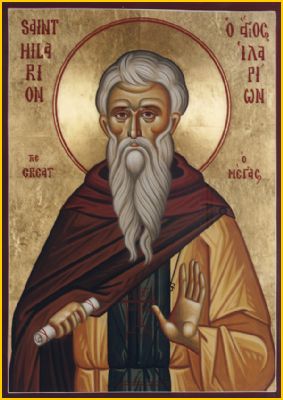|
|||
|---|---|---|---|
| This weekly bulletin insert complements the curriculum published by the Department of Christian Education of the Orthodox Church in America. This and many other Christian Education resources are available at http://dce.oca.org. | |||

Saint Paul wrote the letter to the Christians at Philippi while he was in prison. As he says in the letter's early verses, he so strongly proclaimed the faith that the "whole praetorian guard and all the rest" came to know that his imprisonment was for Christ. Paul mentions his struggles, sorrows and privations in this letter. Those hardships have made him weary, and so have his imprisonment and the trial he is facing. He seems optimistic that the trial could result in his acquittal, saying that it is "my eager expectation and hope that I shall not be at all ashamed." But he warns the Philippians that it may not turn out that way. Then he speaks from the depths of his heart about life and death. Paul knows very well that he will undoubtedly face more difficulties in the days and years to come. Therefore he doesn't hesitate to say that he is hard pressed to know whether life or death is better. In fact, for Paul "to die is gain" and his desire "is to depart and be with Christ, for that is far better." But Paul has given up his own will. So he tells the Philippians that despite his willingness to face death, he must go on living, and working for their "progress and joy in the faith." He is their teacher, guide and example, and they need him. Though it's a struggle, he will continue to serve them. He will put aside his longing to be with the Lord so he can continue to teach the Philippians about the Lord. Saint Hilarion the Great, inspired by Saint Anthony, gave up the prosperous future for which his education had prepared him. He went into the desert to face down demons and to become a friend of God through intense prayer and rigorous fasting. The desert fathers and mothers all had to wrestle with their personal temptations. But the history of Saint Hilarion includes some graphic details about his solitary life. We read that he, like many who went into that solitude, had to overcome "impure thoughts, vexations of the mind and the burning passions of the flesh." The history also tells us that when he was praying he would hear "children crying, women wailing, and the roaring of lions and other wild beasts."
The terror inspired by such sounds and images in the arid desert, far from the reassuring company of other human beings, would make many people long for the city. Perhaps Hilarion sometimes yearned for the comforts and delights of Alexandria, where he had gone to school. Certainly he was fearful, and tempted to leave the desert. But like Paul he made the harder choice for the greater good—in his case, the good of his own soul. Like Paul, he trusted God's leading, even when his own inclination may have been to run as fast as he could in the opposite direction. |
|||
